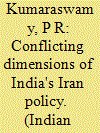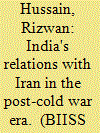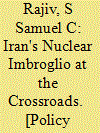| Srl | Item |
| 1 |
ID:
080644


|
|
|
| 2 |
ID:
076847


|
|
|
|
|
| Publication |
2007.
|
| Summary/Abstract |
Since the end of the Cold War, New Delhi has been slowly but surely forging a comprehensive relationship with Tehran based on energy and commercial cooperation, infrastructure development in Iran and beyond, and purported military and intelligence ties. Iran holds particular importance for India as it provides unique access to Afghanistan and Central Asia, two theaters in which India seeks to project greater influence.
Curiously, the Indian-Iranian détente did not attract significant U.S. government attention until the fall of 2005 when, at the direction of President George W. Bush, Congress undertook deliberations to change U.S. law to permit a civilian nuclear deal with India. With the Iranian nuclear crisis deepening in the background, opponents of the deal reasoned that it would enervate the very global nonproliferation regime that was needed to compel Iran to halt fissile material production. Critics and even a few champions of the initiative were wary of the strategic and military ties that New Delhi and Tehran were trumpeting to their citizens while downplaying them to U.S. audiences. To allay these concerns, U.S. officials argued that India's ties with Iran are tied to the former's mounting energy needs. This contention justified the Indian-U.S. nuclear deal, which would diminish India's dependence on Iran, and facilitated the conclusion that Iranian-Indian ties are benign to U.S. interests even if they imply future policy disagreements between New Delhi and Washington.
Although India as a major energy consumer certainly seeks a steady supply of resources, this one-dimensional characterization of Indian-Iranian ties is incomplete. The Indian-Iranian relationship has much more to do with India's great-power aspirations and New Delhi's concomitant expansive agenda for Central Asia and beyond, within which energy is only one, albeit important, consideration. New Delhi has a finely tuned balancing act to sustain. How far can India expand its bilateral ties with Iran while deepening and broadening its critical relations with the United States, Israel, and a host of other states that are wary of Iran?
|
|
|
|
|
|
|
|
|
|
|
|
|
|
|
|
| 3 |
ID:
083794


|
|
|
|
|
| Publication |
2008.
|
| Summary/Abstract |
This paper examines India's relations with Iran in the post-Cold War era. The dissolution of the Soviet Union in 1991 and the corresponding end of the bipolar East-West confrontation distinctly affected the pattern of foreign policy perceptions in the two major states of South and West Asia, namely, India and Iran, respectively. The paper analyses the transformation of India's relationship with Iran from being a distant neighbour in the Cold War to a potential regional ally in the post-Soviet era. It also outlines the strategic, political, and economic rationale behind India's attempts to forge strong ties with the Islamic Republic in the twenty-first century. It highlights the potential areas of co-operation between these two states and at the same time indicates the potential obstacles involved in developing a strong multifaceted relationship.
Among the many peoples and races who have come in contact with and influenced India's life and culture, the oldest and the most persistent have been the Iranians . . . it was out of some common stock that the Indo-Aryans and the ancient Iranians diverged and took their different ways. . . Iran like India, was strong enough in the cultural foundation to influence even her invaders and often to absorb them.
|
|
|
|
|
|
|
|
|
|
|
|
|
|
|
|
| 4 |
ID:
113799


|
|
|
|
|
| Publication |
New Delhi, Institute for Defence Studies and Analyses, 2012.
|
| Description |
59p.Pbk
|
| Series |
IDSA Occasional Paper No.26
|
| Standard Number |
9789382169062
|
|
|
|
|
|
|
|
|
|
|
|
Copies: C:2/I:0,R:0,Q:0
Circulation
| Accession# | Call# | Current Location | Status | Policy | Location |
| 056665 | 327.55054/RAJ 056665 | Main | On Shelf | General | |
| 056666 | 327.55054/RAJ 056666 | Main | On Shelf | General | |
|
|
|
|